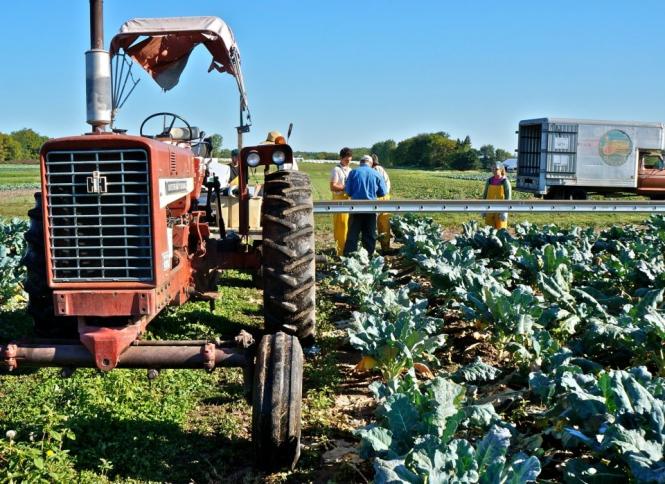This is the first post in a summer-long series from a young farmer working as a harvest crew leader at Gardens of Eagan.
I wish I could say I was born with a shovel in my hand or at least a green thumb in mouth. Ask my mama if she could see my farming potential in the way I cared for plants or loved to be outside or had an affinity for dirt, and she will tell you, in an Alabama drawl where the words stick to each other like bare legs to a leather couch, that I liked to watch “Full House” after school and cared more for primping in skirts than prepping soil. Sure, now farming is my passion, fills my hunger, gives me strength, and all the other sentimentality I’ve written into sonnets over and over again, but it wasn’t always my dream. Before massaged kale salads made special dinner appearances and organic sun gold tomatoes speckled homemade tarts, I ate broccoli smothered in Velveeta cheese and coated my carrots in margarine. Before the soreness of my lower back melded with the aching of my thighs, and the pull in my neck drifted into my shoulders and spine, I ran from farming. I didn’t grow up on a farm; my parents didn’t garden; I hated vegetables.
---
I was picked for farming at the ripe age of sixteen – directionless, impressionable, hungry. My junior year of high school, in need of one final elective, I reluctantly settled for the outdoor-highly-popular-seemingly-slacker-just-what-the-hipster-ordered agricultural sciences class. In the beginning, I slouched in the back of the classroom, making sure my teacher knew, I cared little for what she had to say.

We heard the stories, grown tangled and inseparable from the lands of Alabama, studied the black soils of the south, and explored the dark, decomposing histories of slavery, poverty and sharecropped agriculture. Our teacher drew pictures of American dinner plates and cups full of corn syrup. We dissected obesity, and we planted eggplants. We dug through layers of red clay, Alabama soil and we turned inward, examining our families and lifestyles. We dug down until we hit rock – limestone, sandstone, shale, and chalk – and, like the loamy soil I would come to love, I began the slow but even uptake of nourishment. Mid-semester, I was nutrient-rich and planted myself in one of the school’s concrete raised beds; with sore thighs from a weeding squat, I ran late and sweaty to English class everyday, trading Chaucer for churned compost and sonnets for full-sun. As May rounded the corner, the stubborn girl arriving angry to class was a withered weed and my rejuvenated spirit was in full-bloom.
Farming, I like to say, reconnected me to the South, to my community, to my home, to my family. Sure there was tension at first: battles ensued between my parents and I, demands made, ultimatums given, peace offerings laid out on the kitchen table: “buy the organic carrots,” “strawberries are not in season,” “tomatoes are shipped in from Mexico and California.” I began to sound like a broken record for the organic and local food movements. Eventually we were able to make sense of it all and take our respective places: me in the fields, at the kitchen counter, and at the helm of the grocery cart, my parents at the dinner table, on the living room couches, at the grocery store check outs throwing items out of the cart, hands covering ears, hoping that my organic fury would end.
While sustainable agriculture may not have been as transformative for my family as I like to believe, it did a number on my famished teenage self-worth. Scraping my arms on scattered cucurbit fingernails, staining my index finger and thumb with the oils of basil, dying the hair of my forearms the neon green of tomato pollen – I wore the markings of farming home victoriously. Feeding people, fostering community, finally fending for myself drove me to a world of vegetables.
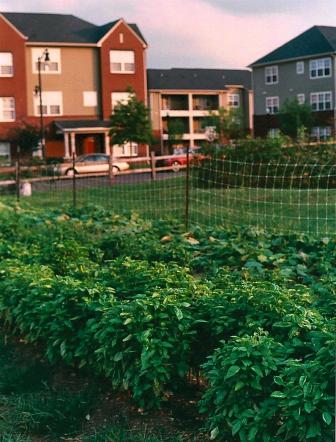 Jones Valley Teaching Farm
Jones Valley Teaching Farm
As the semester of agriscience came to an end, I grew frantic that once home for the summer, I would no longer have any vegetables to tend or any radical ideology to harvest. And then, my teacher advertised an internship with the farm for which she worked; I jumped, like a flea beetle under row cover. Jones Valley Urban Farm (now Jones Valley Teaching Farm) became my mother farm. Taking up one square city block nestled between a highway, health clinic, and newly built mixed income housing, Jones Valley’s mission is “reconnecting people to food” and, more informally stated, rooting young people in their communities and giving them a passion for the soil. For four sweaty summers in the Alabama heat, I was pruned, weeded, and watered until I was a ready transplant, prepared to take root in rocky soils somewhere else.
For the last two seasons, I laid roots in the fertile Hudson Valley, farming as an apprentice and eventually an assistant farm manager at Phillies Bridge Farm Project in New Paltz, New York. There, I lived amongst chickens and goats and beautiful young farmers. During my time at Phillies Bridge, no longer deeply connected to the rich soils of Alabama, I ached for a place to call home. Caring for the land, tending to my fellow farmers, and feeding families, the home we cultivated all season finally became clear to me. Farming was no longer a political act, but a means of reconnecting people, to the land and each other.
---
An early morning last December, after shoving my final tote of frozen strawberries and winter squash into my Subaru, my brother and I squeezed into the remaining space of the front seats and headed for Minnesota. In my life, there have been zero times that I contemplated moving to the Midwest. In August of last year, I visited Minneapolis and the butter queens of the State Fair for the first time. Before that, nada, not a blip on the radar, nothing pointing me out here to the icy tundra.
So why here? Why now? I moved to Minneapolis for love. Fresh out of college, out of a job, out of the family home, I had nowhere to be, except in the kitchen with my boo, defrosting kale from October and corn from mid-July.
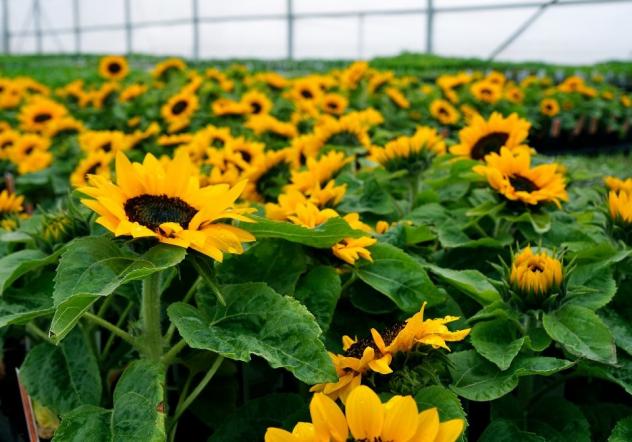 Sunflowers at Gardens of Eagan
Sunflowers at Gardens of Eagan
Of course, almost immediately, Minneapolis, without wooing or courting or even batting its eyelashes, left me moonstruck. Lovesick on the bike trails, coffee shops, and rad people, I turned down every opportunity to leave the cities. I turned down seven farming jobs, in fact, in order to work the early shift at a locally-owned downtown coffee shop and still have time for an internship with Second Harvest Heartland in the SNAP Outreach Department. There’s no denying that I loved it, that the pain of rising at an early 5:00 every morning to schlep through the snow to my bus and riding back and forth across the Mississippi several times a week to get in the hours for my internship, both fueled my hunger for the city and gave me a passion for something other than soil.
But the craving did not last. There were moments, standing in the little skyway coffee shop, looking at my clean, un-calloused hands, watching sunlight drip slowly in through the only window for what seemed like blocks, when I felt claustrophobic; I needed to be outside.
By mid-March, in a crazy, ravenous desperation of constant job searching, resume sending, pseudo-networking, I finally landed a job just thirty miles south of Minneapolis, at a place called Gardens of Eagan. Truthfully, I knew very little about the history of the farm or how it became and remained such a successful operation for the past 40 years.
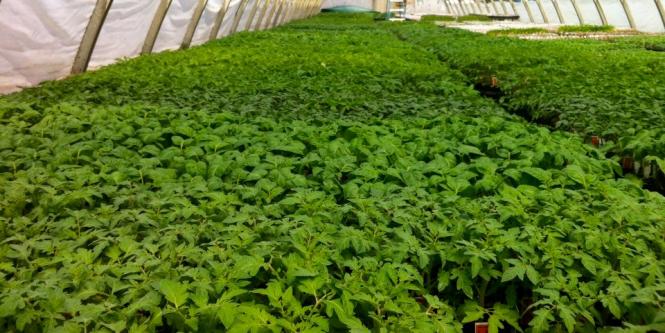 A hoophouse at Gardens of Eagan
A hoophouse at Gardens of Eagan
Run by the Diffley family from 1973-2007, GOE is now owned by the Wedge Co-op in Uptown Minneapolis and operates as both a production farm, with 125 acres of greenhouse and production land and an educational space, operating the non-profit Organic Field School, which hosts incubator farms (one of their current incubator farms is Bossy Acres, whose co-owner Elizabeth Millard writes the Behind the CSA Box series on SGT). Harboring the OFS makes working at GOE a unique opportunity – crew members not only tend the crops for the farm, but cultivate relationships with young, fresh farmers, who are trying to get their feet off the ground.
When I went in for my first day of work, I will not deny the anxiety bubbling in my stomach. Phone calls put me on edge and cross-country moves keep me up all night. Starting a new job at a farm 25 times the size of anything I’ve ever seen before did quite a number on my nerves. I’m scared. Big farms mean big innovations and lots of big machinery. I’ve farmed small city blocks and 6-acre fields, but nothing this size. But my anxiety is not all fear. I am anxious to get out in the fields and excited to watch the transformation of the land, and also to see the inner workings of a production, profit-driven farm.
At the beginning of every season my managing farmers ask me what I hope to gain from my experience, what I want to get out of my time in the fields. Knowing so little about farming on this scale, I feel I am starting anew. So I hope I come out of the fields this season with a rejuvenated farming spirit, a body in one piece, and a full belly at the day’s end.
Photos of Garden of Eagan (tractor at top, sunflowers and hoophouse at bottom) by Libby Wyrum
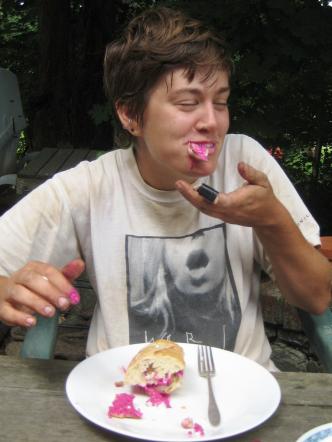
Katie Willis is a native of Birmingham, Alabama, where she grew up with NASCAR, twangs and drawls, and lots of fried okra. Her farming career began on an urban farm in Birmingham, where she ate arugula and swiss chard for the first time in her life. Eventually she moved to rural New York to work with chickens, goats, and really strong women. She enjoys a rowdy round of arm wrestling, discussions on all things related to heternormativity, seasonal food preservation, long bike rides, Toni Morrison, and ice-cold beer. Katie recently moved to the Twin Cities with her girlfriend, Lily. They live in Powderhorn and eat lots of butter, maple syrup, and frozen kale. This year marks her seventh season with soil underneath her fingernails and a bounty in her fridge.

